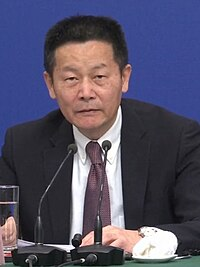Insights from China's Capital Market Transformation
In recent years, China has placed a strong emphasis on the high-quality development of its capital markets as part of a broader effort to modernize its economy. The nation's capital markets, which include both the stock and bond markets, are increasingly seen as key players in promoting technological innovation, economic resilience, and long-term growth. As part of this initiative, the China Securities Regulatory Commission (CSRC) has undertaken a series of reforms aimed at strengthening market infrastructure, improving transparency, and encouraging innovation.
////
Capital Market Development in the Context of National Strategy
ONE

The importance of capital markets has never been more pronounced, particularly given China's evolving economic goals. According to Wu Qing, a senior official at the CSRC, the rapid pace of technological advancement and industrial transformation requires a financing ecosystem that is flexible, inclusive, and capable of accommodating the unique needs of innovative enterprises. The push for high-quality development is intrinsically tied to the nation's ambition to foster a more resilient economy, capable of navigating the challenges posed by global competition and technological disruption.
In Wu's view, capital markets play a vital role in providing the necessary funding for emerging technologies and industries, facilitating the shift from traditional production methods to more advanced, tech-driven models. This transformation is seen as a cornerstone of China's broader economic strategy, which seeks to achieve sustainable, innovation-led growth.
////
Key Reforms and Policy Measures
TWO

The recent reforms led by the CSRC are designed to address several key issues in the capital markets.
These include:
-
Improved Regulation and Risk Management: The CSRC has implemented measures to enhance oversight of market activities, particularly in the areas of fraud, market manipulation, and financial misreporting. In 2024, for example, the CSRC introduced stricter requirements for financial disclosures and expanded its investigation of corporate fraud. These actions were aimed at restoring investor confidence and ensuring the integrity of the market.
-
Strengthening the Role of Institutional Investors: One of the central tenets of the reform agenda is the facilitation of long-term investments. The introduction of policies that encourage institutional investors, particularly pension funds and insurance companies, to increase their exposure to the Chinese market is seen as crucial for stabilizing the capital flow and supporting sustainable growth. In 2024, the CSRC unveiled a new set of guidelines designed to attract and channel long-term capital into China's stock and bond markets.
-
Market Structure and Accessibility: The transition from a rapidly growing market to one focused on quality requires a more nuanced understanding of market structure. The CSRC has implemented several measures aimed at improving market access for companies and investors alike. These include expanding the Qualified Foreign Institutional Investor (QFII) system, as well as policies designed to increase the participation of technology-driven companies in the market.
-
Support for Innovation and High-Tech Industries: China's capital market reforms are also designed to support the development of high-tech industries. The introduction of special policies for emerging sectors, including the “Support for Innovation” guidelines, aims to direct capital toward sectors such as artificial intelligence, biotech, and clean energy. By doing so, the Chinese government hopes to foster the growth of industries that will drive the nation's economic future.
////
International Implications and Global Competitiveness
THREE
For international businesses, these reforms signal a shift in China's economic strategy that may open up new opportunities for foreign investors. As China continues to refine its capital markets, the implications for global investors and financial institutions are substantial.
-
Increased Access to a Growing Market: The gradual opening of China's capital markets, particularly through the expansion of the QFII and Stock Connect programs, offers international investors increased access to a wider range of Chinese financial assets. These reforms are designed to facilitate cross-border capital flows, benefiting both Chinese companies seeking global funding and foreign investors looking to tap into China’s dynamic economy.
-
Opportunities in Innovation: As China ramps up its focus on supporting innovation-driven industries, foreign investors will find new avenues for capital deployment, particularly in high-tech sectors. The policy measures surrounding the “Science and Technology Innovation Board” (STAR Market) and other initiatives are expected to attract significant interest from international venture capital and private equity firms.
-
Regulatory Alignment with International Standards: With the introduction of more stringent regulatory measures, China's capital markets are increasingly aligning with international standards, particularly in the areas of corporate governance, financial transparency, and investor protection. This alignment not only helps reduce the risks associated with investing in Chinese markets but also enhances the credibility of Chinese companies on the global stage.
////
A Balanced Approach to Growth and Stability
FOUR
China's capital markets face a delicate balancing act between promoting growth and ensuring stability. The goal is to continue supporting the expansion of high-tech industries while managing risks effectively. In Wu Qing's words, the key to success lies in maintaining a steady course that prioritizes both financial innovation and regulatory rigor.
The CSRC's emphasis on ensuring the long-term health of the market reflects a broader recognition that growth must be sustainable. By fostering a more diversified and transparent capital market, China hopes to build a foundation for stable, long-term economic growth. For international stakeholders, this means that China's capital markets will likely continue to evolve in ways that offer new opportunities for investment while maintaining a focus on systemic stability and regulatory compliance.
As the Chinese government continues to refine its approach to capital market reform, the global financial community will need to stay informed of developments, ensuring that they can adapt and take full advantage of the emerging opportunities in China's growing capital market ecosystem.






















































First, please LoginComment After ~